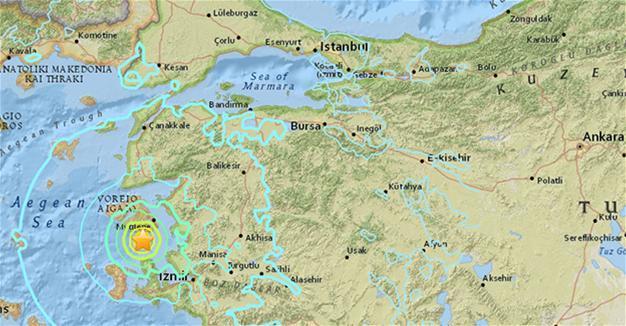6.2-magnitude quake rocks western Turkey, Greek island
ISTANBUL

Source: USGS
An earthquake with a magnitude of 6.2 struck near the coast of western Turkey at 3:28 p.m. local time on June 12, shaking buildings in the Aegean province of İzmir and rattling areas close to the region, Turkey’s Disaster and Emergency Management Authority (AFAD) announced.The epicenter of the quake was located 22.98 kilometers of the Karaburun district in İzmir at a depth of 6.96 kilometers, AFAD said.
Two aftershocks further hit the district, the first at a magnitude of 4.9 at 3:35 p.m. local time, and the second at a magnitude of 4.5 at 3:47 p.m. local time.
Turkey’s Kandilli Observatory and the Earthquake Research Institute initially announced the size of the first quake as 6.3, but then revised it to 6.0 later on in the day, indicating that the quake hit a depth of 10 kilometers.
On the other hand, the European-Mediterranean Seismological Centre (EMSC) said on its website that the epicenter of the quake was located some 84 kilometers northwest of İzmir and announced the magnitude as 6.3.
The U.S. Geological Survey (USGS) said the epicenter of the quake was in the Aegean Sea, 11 kilometers south of Plomari, a village on the southern coast of Lesbos.
The mayor of Plomari, Manolis Armenakas, told ERT state television: “We have damage to several buildings, old and new. We are now evaluating the damage.”
The Greek Institute of Geodynamics also confirmed the quake shook the eastern Aegean, close to the Samos and Lesbos Islands.
In Turkey, people who felt the earthquake in western provinces panicked, many taking to the streets.
“For now, I can say that there is no loss of life and property, thank God,” Karaburun District Gov. Muhammet Özyüksel told daily Hürriyet. “It was a very powerful quake. Be assured that we thought that the building we were in would collapse. The quake lasted about 10 seconds. There is no problem as of now regarding dwellings.”
İzmir Gov. Erol Ayyıldız also told state-run Anadolu Agency that there was no loss of life or property that had been notified to them yet, but AFAD has reported to have sent 240 family tents sized 16.5 square meters to İzmir’s Dikili and Karaburun, which have been affected the most, as a precautionary measure.
Meanwhile, experts on quakes spoke to Hürriyet regarding the incident. Dr. Övgün Ahmet Ercan called it “an energy with the power released by two atomic bombs.”
“Turkey is a region of earthquakes. They can happen anytime. We need to think as if the biggest quake will happen tomorrow. There is no meaning in postponing the precautions. National mobilization is needed immediately. We need to make the Marmara region, above all Istanbul, a secure place for disasters. This needs to be priority in Turkey,” said an expert on disaster management, Dr. Mikdat Kadıoğlu.
Turkey and Greece sit on significant fault lines and have regularly been hit by earthquakes in recent years.
This year alone, Turkey’s western Aegean coast was hit by several earthquakes with magnitudes up to 5.5, bringing back memories of deadly earthquakes from the past.
On Aug. 17, 1999, a huge earthquake measuring more than 7.0 magnitude near the city of İzmit caused vast devastation in the country’s densely populated northwestern zone, most notably around Istanbul, killing over 17,000 people.


















